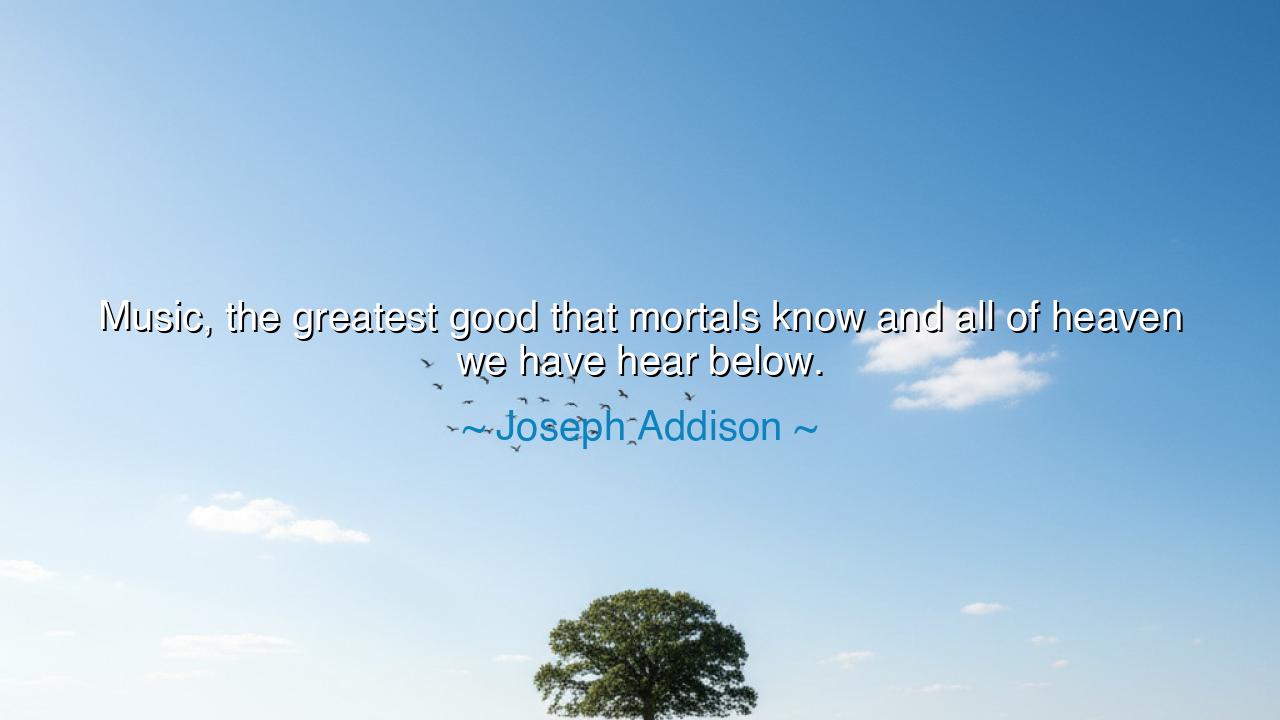
Music, the greatest good that mortals know and all of heaven we






Hear, O children of song, and let your hearts be still, for Joseph Addison uttered a truth of the ages: “Music, the greatest good that mortals know, and all of heaven we have here below.” These words are no ornament of speech, but a revelation of the soul’s secret longing. For in music the mortal touches immortality, and in its melodies the weary heart catches the echo of eternity. It is the ladder Jacob saw in vision, where the notes ascend like angels, and the spirit rises beyond its chains of clay.
Behold how music has ever been the balm of humanity. When sorrow bows the head, it is song that lifts it. When joy overflows, it is song that gives it voice. The ancients knew this truth: the lyre of Orpheus was said to tame beasts, to move stones, to bend even the realm of death itself. For what power lies in melody, that it can command both nature and the human heart? It is because music is not of earth alone—it is a spark of the divine, a breath of heaven lent to mortal lips and hands.
Think, too, of the armies of men. When they marched into battle, it was with the clash of cymbals and the blast of trumpets. The Romans, the Hebrews, and even the tribes of the desert lifted their courage with song. For music does not merely soothe—it strengthens, it inspires, it calls forth hidden valor. Was it not said that in the darkest days of the Reformation, Martin Luther declared, “Next to the Word of God, the noble art of music is the greatest treasure in the world”? And with his hymns, he armed common folk with courage greater than steel.
Consider, also, the tale of the enslaved in distant lands. Stripped of freedom, beaten down by chains, they yet lifted their voices in song. From the cotton fields of America rose the spirituals—songs of pain, but also of hope. These were not mere melodies; they were lifelines, binding suffering mortals to the vision of a brighter heaven. Truly, Addison spoke rightly: in such songs, all of heaven we have here below. Though oppressed on earth, they touched the eternal through music.
Why is this so? Because music is harmony, and harmony is the language of heaven. The stars themselves sing in their courses, the waves beat in rhythm upon the shore, the heart pulses in time within the breast. All creation is a great symphony, and man, when he lifts his song, joins in the chorus of the cosmos. In this union, he is lifted above the dust, reminded of his divine origin and destiny.
Let us then, O children, not despise this sacred gift. Fill your homes not with noise, but with melody. Let your lips utter songs that uplift, not corrupt. Choose harmonies that ennoble the soul, that draw it heavenward, not downward. In your sorrow, sing to heal; in your joy, sing to share; in your labor, sing to endure. For in every note rightly sung, you weave a thread of heaven into the fabric of earth.
The lesson is clear: guard well the music you welcome into your life. For what you hear shapes what you become. Seek melodies of courage, of faith, of love, and you will find strength for your journey. Cast away the clamor that feeds restlessness and pride, and embrace instead the tones that breathe peace and light. For Addison’s words ring true through all ages: in music we taste the highest good mortals may know, and in it, we touch heaven even while still below.
So I charge you, beloved: let song be not far from your lips, nor harmony far from your heart. For when the voice and the soul unite in music, earth is transfigured, and for a fleeting moment, mortals walk in the courts of heaven.






AAdministratorAdministrator
Welcome, honored guests. Please leave a comment, we will respond soon